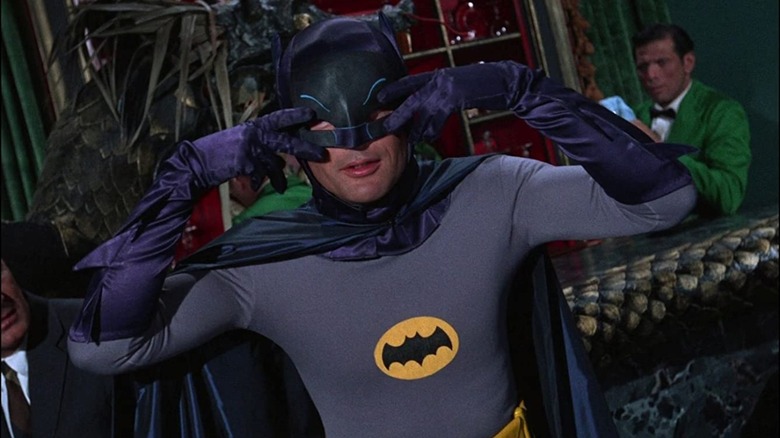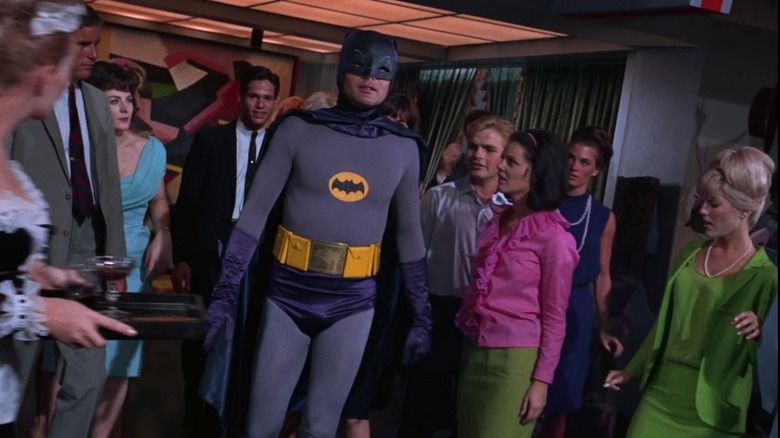Adam West Was Hesitant To Play Batman Until One Comical Scene Convinced Him
William Dozier's "Batman" TV series went off the air in March 1968, and it's been downhill for the character ever since. "Batman" is an unabashed work of genius, a series that took a pop figure from the late 1930s and updated him into a sublime comedic figure, wielded to satirize superheroes and the bizarre, colorful worlds they live in. Batman and Robin were upright citizens to the point of absurdity. They would drink milk, play chess, and trade trivia about the Ancient Greeks, before absquatulating to the Batcave where they, stonefaced, would talk about their surreal computer equipment and oddball costumes. As the stars, Adam West and Burt Ward were sublime, playing broadly comedic characters without once winking to the camera or letting the satirical façade crack.
It was gorgeous, broad, and colorful. Batman hasn't reached these highs since. Some of the other Batman movies and TV shows made since 1968 have been fine, I suppose, but somehow the character was transformed from a bright-colored, po-faced cartoon figure into a violent, brooding weirdo. Those with good taste prefer the former.
West needed some convincing to star in "Batman." Superhero properties were often popular, of course — "The Adventures of Superman" was a legitimate pop phenomenon about 14 years earlier — but few actors walked away from kid-friendly comic book entertainments with their careers wholly intact. According to West's autobiography "Back to the Batcave," however, West recalls reading the script for "Hi Diddle Riddle," the "Batman" pilot episode, and reading a single comedic line of dialogue that communicated quite clearly what the show was, and how funny it was going to be.
It's Batman!
West addressed the generally accepted showbiz distaste for superhero entertainment in the 1960s by saying that the "conventional wisdom in Hollywood was that donning a costume was the equivalent of slipping into a career straitjacket." So West was reluctant to play Bruce Wayne. "Hi Diddle Riddle," however, written by Lorenzo Semple, Jr., caught his eye.
"Hi Diddle Riddle" sees Batman going to a local discothèque called What a Way to Go-Go, following clues left behind by the nefarious Riddler (Frank Gorshin). Because Robin is not of age, Batman goes in alone. When he enters the room, Batman is instantly recognized as the local celebrity he is. "It's Batman!" the dancers yell. A nervous cigarette girl asks to check his cape. Then a maître d' approaches him. The interaction between Batman and the maître d' cliched it for West. He wrote:
"In the script, Batman had just entered a restaurant in full costume and was telling the maître d' he preferred to sit at the bar instead of a table since 'I shouldn't wish to attract attention.' What was funny wasn't only the concept of this man in a flashy cowl and cape honestly thinking he could be inconspicuous. What made the script and the character work was the scrupulously formal language that made you believe he believed it."
It was the absurdity of the line that tickled West. A man in a mask and bat costume trying not to call attention to himself was delightfully strange. That, and Batman's utter earnestness. He was a serious crimefighter, even though he had weird gadgets and felt the need to wear a goofy outfit.
An unassailable comedy show was born.

